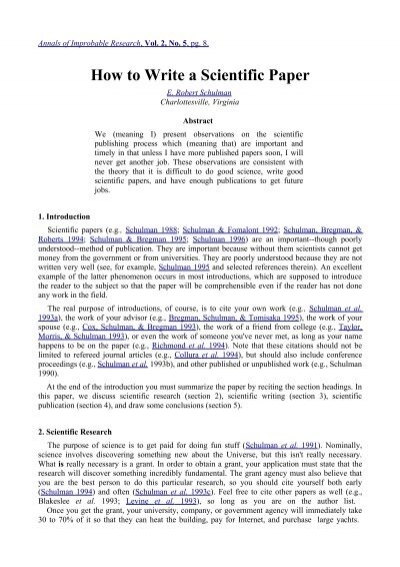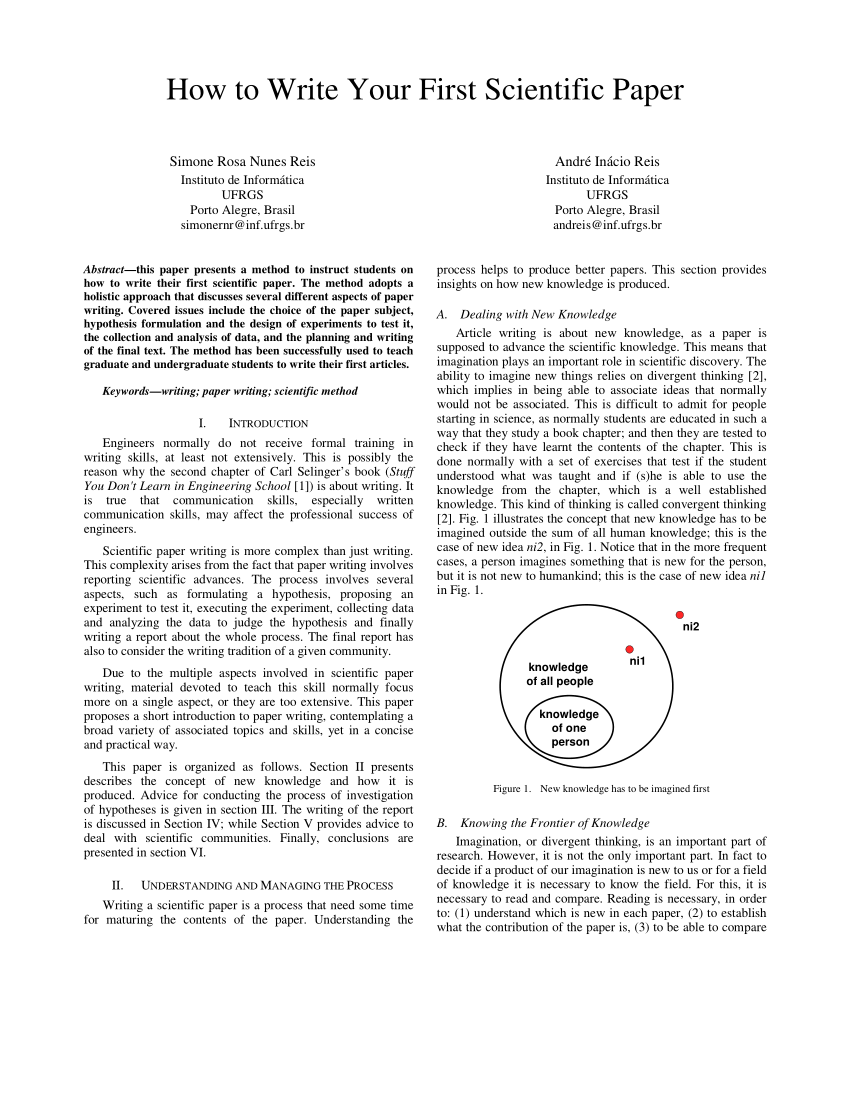
Writing an effective scientific paper is not easy. A good rule of thumb is to write as if your paper will be read by a person who knows about the field in general but does not already know what you did. Before you write a scientific paper read some scientific papers that have been written in the format of the paper you plan to use. In addition to the science, pay attention to the writing • Analyze audience and purpose to focus your writing. Writing • Start with whatever section is easiest to write. • Skip around to different sections as needed. • Keep writing. Revision • Work on content first, then structure, then style. • Keep focused on your main purpose: communicating, reasoning, presenting clearly. • Get blogger.com Size: 45KB The main goal of writing a scientific paper is to reveal validity, importance and final outcomes of a research, so this paper should be organized according to a certain scheme: Introduction (this part often tells about the scholar’s motivation to conduct this
Guide: Writing the Scientific Paper
To celebrate British Science WeekProf John Sumpter, a professor of ecotoxicology at Brunel University London and author of How to be a Better Scientistshares with us the secrets to writing a knock-out research paper. A good paper is one that grabs the attention of scientists in your own field whilst turning the heads of scientists in others. When you succeed in writing one, its impact becomes self-evident as you watch your citations quickly accumulate, writing a scientific paper.
Ultimately, all your hard work will have failed to writing a scientific paper its full-potential. Far too many papers fail to have any impact — will yours? Half of all scientific papers are never cited. Some of them are probably never read. You want to avoid your paper being one of those. You might think that all scientists swiftly appreciate the writing a scientific paper of all papers in their field, however, this is not so.
Learning how to communicate your results is crucial to scientific success! Have you told a story? Explain why the topic is important and how the absence of knowledge is inhibiting progress. That will generate curiosity. Then tell the reader only what they need to know, not everything you know about the topic. Tell them one story, not many half-stories. Has your paper got structure? Some of our best scientists take a surprisingly short time to write a good paper.
Writing a scientific paper, then, do you struggle for months, even years, to complete one? The key to success is that a good scientist thinks very carefully about the structure of his or her paper before starting to write. So think carefully about what should go in, and what should be discarded, in order to tell your story. Have you made things too complicated. It is a common misconception that a clever scientist is someone who uses highly complex scientific language in their papers — the real-world result is that lesser scientists have to re-read those sentences and paragraphs several times before understanding them.
The truth is that good scientists write in simple, writing a scientific paper, clear language that is widely understood, because they want to communicate to as wide an writing a scientific paper as possible. Remember that many of the potential readers of your paper will be from other countries, writing a scientific paper, and not have English as their first language.
Is your title as good as it can be? Most readers decide whether or not to read a paper based on the title alone — as such, nothing is more important than the title.
Keep it as short, simple and general as possible. Ideally it should be no more than 10 words, writing a scientific paper. The latter title will attract many more readers.
Have you got a rewarding abstract? The next most likely part of your paper to be read is the abstract. This is usually the clinching factor on whether or not someone will read the entire paper.
Consider the abstract as your shop window — you are trying to attract people into your shop to buy your work. The abstract should be a very brief description of what the problem was, writing a scientific paper, what was done, and what was found your results. End by suggesting what the implications of your research are to the wider world.
Writing a good abstract is undoubtedly a real skill. And you have to do so in no more than or words! People love figures, are yours clear? People love pictures figures much more than they do text. Readers will often look at the figures in a paper first, writing a scientific paper, hoping to learn most, or even all, of what they find interesting about the paper. They may not read the text! So, consider two things — which figures to use and how to display your data to its best advantage in those figures.
Make sure that you tell your story through a short sequence of figures. Have honest colleagues to read and criticised your paper? Remember that you are the expert here.
But you are not writing the paper for yourself, you want writing a scientific paper scientists to read it. So, seek the opinions of other scientists — perhaps a couple of your fellow Ph. They will be representative of the readers you want to attract to your paper and they will know something about the topic of your paper, but not have the depth of knowledge that writing a scientific paper do.
Be open to their suggestions for improving the paper. Have you taken on critical reviews to improve your paper? Once submitted, your paper will most likely be reviewed by 2 or 3 anonymous reviewers. You might receive some critical comments back from the editor.
Calm down. If the editor gives you the opportunity to resubmit your paper once you have responded to the reviewers comments, take it. But, be positive and constructive when you respond to any critical comments. Do not dismiss critical comments as ill-informed. Use those comments to improve your paper. Every paper I have written has been improved, writing a scientific paper, often a lot, by my responses to the comments of reviewers and editors. Exit Menu Home News and Events News How to write a good scientific paper.
How to write a good scientific paper Share this By Dr John Sumpter. Have you made things too complicated It is a common misconception that a clever scientist is someone who uses highly complex scientific language in their papers — the real-world result is that lesser scientists have to re-read those sentences and paragraphs several times before understanding them.
How to be a Better Scientist is available from Amazon for now.
How to Write a Paper in a Weekend (By Prof. Pete Carr)
, time: 11:39How to Write a Scientific Paper – Paperstime scientific paper writing service

• Analyze audience and purpose to focus your writing. Writing • Start with whatever section is easiest to write. • Skip around to different sections as needed. • Keep writing. Revision • Work on content first, then structure, then style. • Keep focused on your main purpose: communicating, reasoning, presenting clearly. • Get blogger.com Size: 45KB The main goal of writing a scientific paper is to reveal validity, importance and final outcomes of a research, so this paper should be organized according to a certain scheme: Introduction (this part often tells about the scholar’s motivation to conduct this 10/1/ · Writing a Scientific Paper: INTRODUCTION Citing Sources in the Introduction It is important to cite sources in the introduction section of your paper as evidence of the claims you are blogger.com: John Sisson

No comments:
Post a Comment